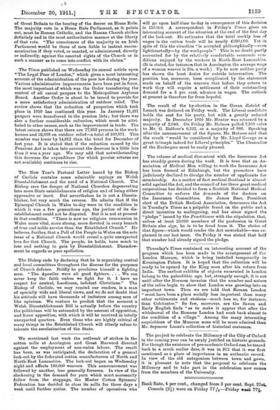We mentioned last week the outbreak of strikes in the
cotton mills at Accrington and Great Harwood directed against the employment of non-union labour. The result has been, as was anticipated, the declaration of a general lock-out by the federated cotton manufacturers of North and North-East Lancashire. The lock-out began on Wednesday night and affects 160,000 weavers. This announcement was followed by another, less generally foreseen. In view of the slackening in the demand for yarn which must necessarily follow from the stoppage, the Master Cotton Spinners' Federation has decided to close its mills for three days a week until further notice. The number of operatives who
will go upon half-time to-day in consequence of this decision is 150,000. A correspondent in Friday's Times gives an interesting account of the situation at the end of the first day of the lock-out. He estimates that the total weekly loss of wages in the cotton trade will be nearly £300,C00. Yet in spite of this the situation "is accepted philosophically—even lightheartedly—by the workpeople." This is no doubt partly accounted for by the relatively comfortable economic con- ditions enjoyed by the workers in North-East Lancashire. (It is stated, for instancy that in Accrington the average wage of a woman weaver is 20s. a week.) Up to now neither party has shown the least desire for outside intervention. The position has, moreover, been complicated by the statement made on behalf of the weavers that before they return to work they will require a settlement of their outstanding demand for a 5 per cent. advance in wages. The outlook at present is therefore far from hopeful.






































 Previous page
Previous page